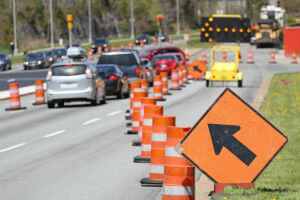Spring and summer have traditionally been the months for construction on Virginia’s highways, streets, and roads. However, according to the National Highway and Traffic Safety Organization (NHTSA), work zones on roads across the nation have become increasingly dangerous for both workers and commuters.
A work zone is defined as a designated stretch of road or highway where work is taking place, usually to improve road conditions. Work zone areas often involve detours and lane closures, as well as tractors and other equipment in the area where the construction is taking place. This significantly impacts the risks of car accidents in the work zone area. Anytime there is a change to the normal flow of traffic, there is a higher chance of being involved in a crash.
In Virginia, a separate set of driving rules applies to vehicles moving through these areas, with speed reductions and cautious driving being the most important restraints drivers are expected to follow. Violators are subject to additional fines if caught.
As a driver, you may be extra cautious when driving through work zone areas, however, there are often other drivers who are not so cautious. This is why it is so important to take the following steps in order to minimize your risk of being injured in a work zone crash:
- Make sure to slow down your speed. Be aware of the speed of traffic around you.
- Always expect the unexpected whenever you are driving through areas that are marked as road work zones.
- Stay patient while driving through the work zone. Traffic tends to be backed up in these areas, but it is important not to get frustrated with expected delays. This is why it is good to plan ahead and leave earlier than planned to ensure you reach your destination on time.
- Stay alert and pay close attention to any posted signs.
- Always obey the directions given by any posted signs, electronic signage, flagger, or police officer who is on the scene directing traffic.
- Always drive defensively.
- Make sure to leave plenty of space between your vehicle and the vehicle in front of you. You never know when there will be sudden stops in these zones.
- When changing lanes, use the “Take 10” technique. Put on your turn signal for three seconds before you begin to change lanes. Allow a minimum of seven seconds to complete the lane change, making sure to check your rearview and side mirrors as you are making the change.
Who Is Liable?
As with any car accident, liability for the crash is often on a vehicle driver. Maybe the other driver was engaged in a distracted driving activity and did not realize traffic had slowed down or stopped. Or maybe the other driver became confused while driving through the work zone and suddenly stopped their vehicle in the middle of traffic.
But it is not just another driver that could be liable for a work zone crash. Construction companies have a duty to operate their project in a safe manner, to avoid creating additional dangers, and to warn of existing dangers. Failing to fulfill these duties could expose the company to liability if an accident occurs in the work zone.
A Virginia car accident attorney can help determine what party is liable for the crash and the victim’s injuries, as well as pursue legal action to collect damages for the losses those injuries have caused.
Speak to a Virginia Car Accident Attorney
All car accidents have the potential to permanently change the trajectory of a person’s life. If you suffered injuries in a car accident, and need compensation to find some amount of recovery, talk to a Virginia car accident attorney from Shapiro, Washburn & Sharp to find out all your legal options.
Car accident injuries should not be ignored, and you deserve compensation for your suffering. Our firm has more than three decades of experience successfully advocating for injured victims and their families and will work diligently to get you the financial compensation you deserve. Call our office today to schedule a free and confidential case evaluation and find out how we can help.
RELATED CONTENT
